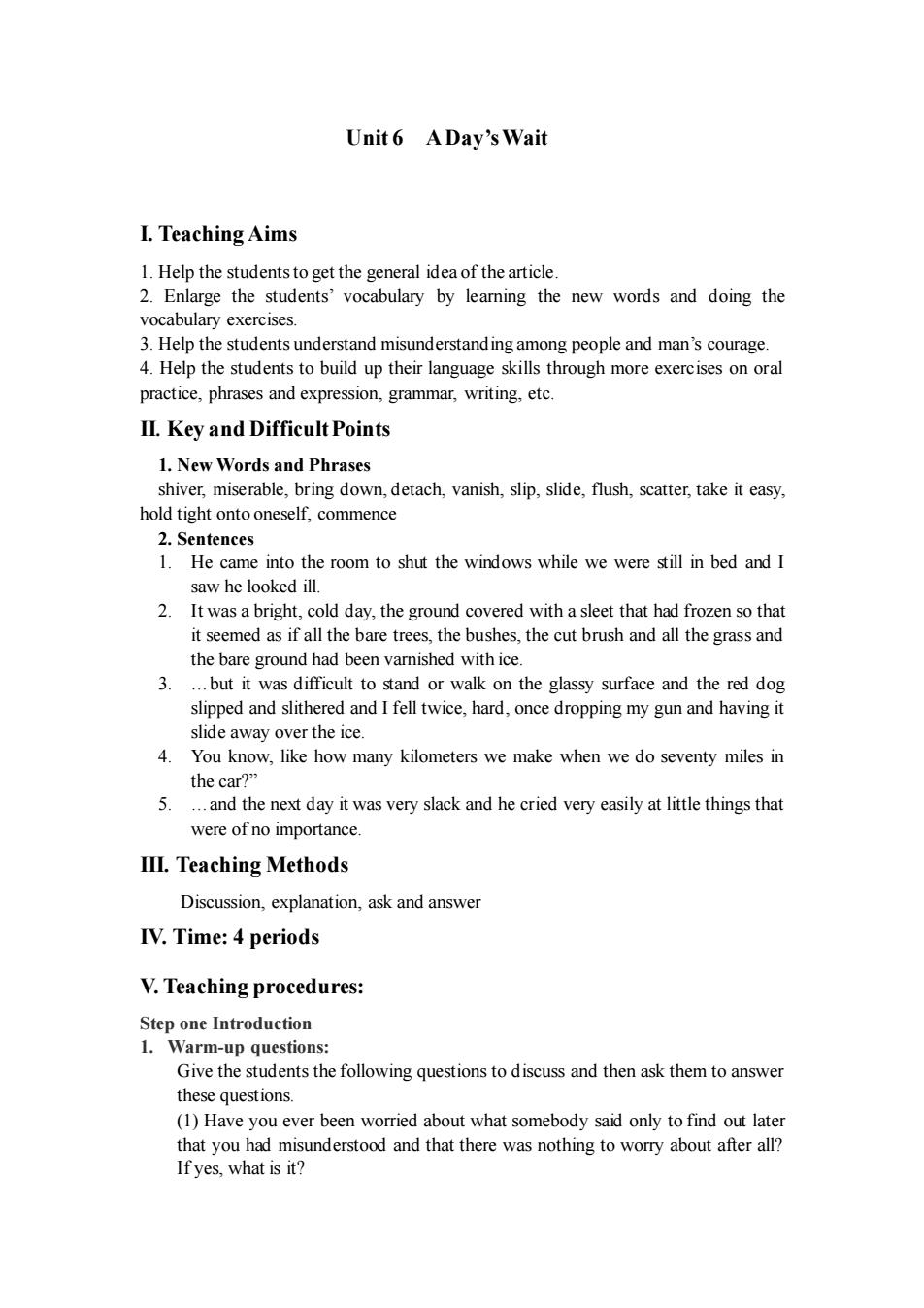
Unit6 ADay's Wait I.Teaching Aims 1.Help the studentsto get the g eneral idea of the article 2.Enlarge the students'vocabulary by learning the new words and doing the vocabulary exercises. 3.Help the students understand misunderstanding among people and man's courage. 4.Help the students to build up their language skills through more exercises on oral practice.phrases and expression,grammar,writing.etc. II.Key and Difficult Points 1.New Words and Phrases shiver,miserable,bring down,detach,vanish,slip,slide,flush,scatter,take it easy. hold tight onto oneself.commence 2 S entence 1. He came into the room tos the windows whil we were in bed ard I saw he looked ill. 2.It was a bright,cold day,the ground covered with a sleet that had frozen so that it seemed as if all the bare trees,the bushes,the cut brush and all the grass and the bare ground had been vamished with ice 3. but it was difficult to nd or walk on the glassy surface and the red dog slipped and slithered and I fell twice,hard,once dropping my gun and having it slide away over the ice. 4.You know,like how many kilometers we make when we do seventy miles in the car?" 5. and the next day it was very slack and he cried very easily at little things that were of no importance III.Teaching Methods Discussion,explanation,ask and answer IV.Time:4 periods V.Teaching procedures: Step one Introduction 1.Warm-up questions: Give the students the following questions to discuss and then ask them to answer these questions (1)Have you ever been worried about what somebody said only to find out later that you had misunderstood and that there was nothing to worry about after all? Ifyes,what is it?
Unit 6 A Day’s Wait I. Teaching Aims 1. Help the students to get the general idea of the article. 2. Enlarge the students’ vocabulary by learning the new words and doing the vocabulary exercises. 3. Help the students understand misunderstanding among people and man’s courage. 4. Help the students to build up their language skills through more exercises on oral practice, phrases and expression, grammar, writing, etc. II. Key and Difficult Points 1. New Words and Phrases shiver, miserable, bring down, detach, vanish, slip, slide, flush, scatter, take it easy, hold tight onto oneself, commence 2. Sentences 1. He came into the room to shut the windows while we were still in bed and I saw he looked ill. 2. It was a bright, cold day, the ground covered with a sleet that had frozen so that it seemed as if all the bare trees, the bushes, the cut brush and all the grass and the bare ground had been varnished with ice. 3. …but it was difficult to stand or walk on the glassy surface and the red dog slipped and slithered and I fell twice, hard, once dropping my gun and having it slide away over the ice. 4. You know, like how many kilometers we make when we do seventy miles in the car?” 5. …and the next day it was very slack and he cried very easily at little things that were of no importance. III. Teaching Methods Discussion, explanation, ask and answer IV. Time: 4 periods V. Teaching procedures: Step one Introduction 1. Warm-up questions: Give the students the following questions to discuss and then ask them to answer these questions. (1) Have you ever been worried about what somebody said only to find out later that you had misunderstood and that there was nothing to worry about after all? If yes, what is it?
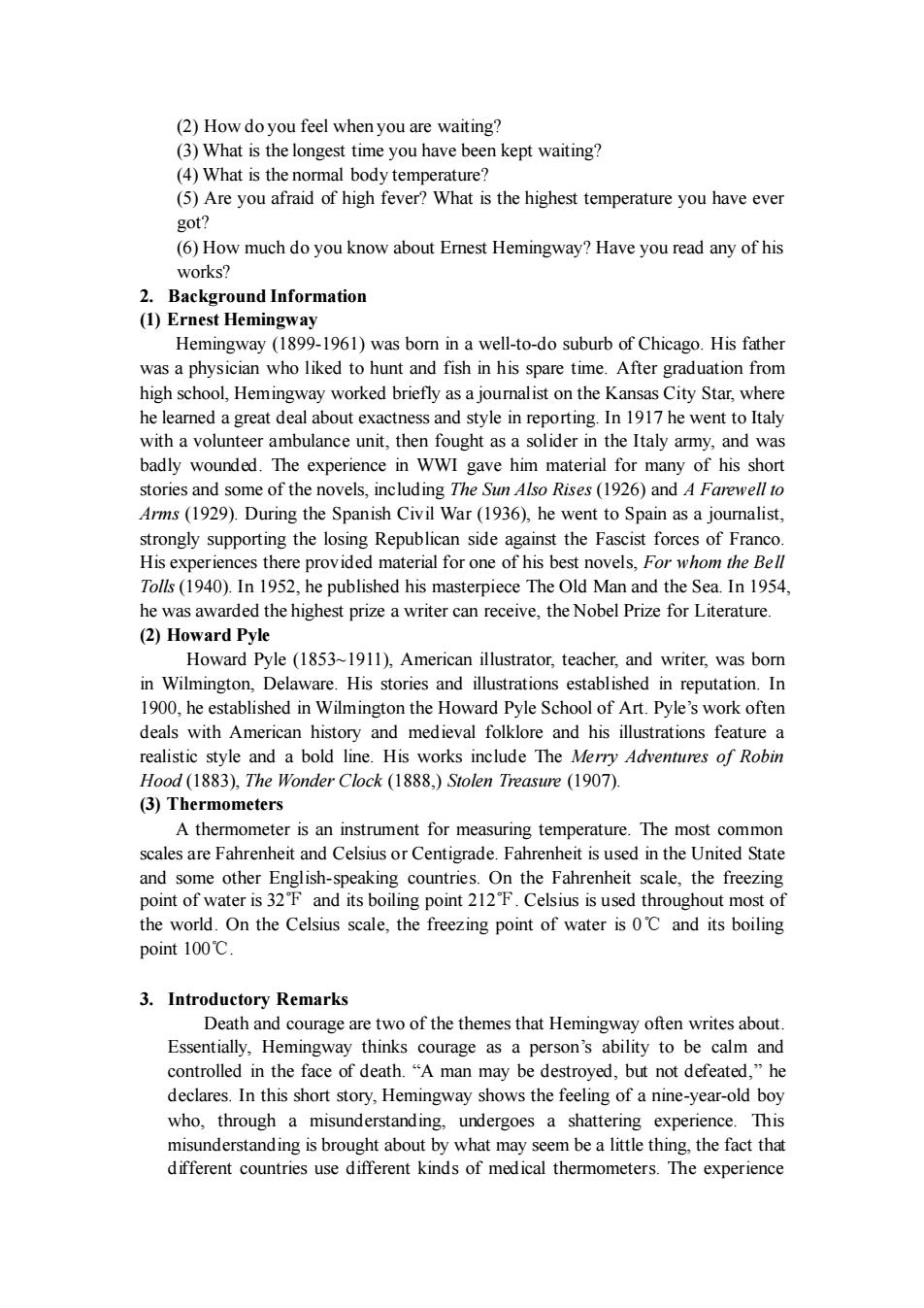
en kept waiting? (4)What is the normal body temperature? (5)Are you afraid of high fever?What is the highest temperature you have ever got? (6)How much do you know about Emest Hemingway?Have you read any of his works? 2.Background Information (1)Ernest Hemingway Hemingway (1899-1961)was bomn in a well-to-do suburb of Chicago.His father was a physician who liked to hunt and fish in his spare time.After graduation from high sch l.Hemin vay worked briefly asa jo aliston the Kans sas City Star,where d a great deal about exactness and style in reporting.In 1917he went to Italy with a volunteer ambulance unit,then fought as a solider in the Italy army,and was badly wounded.The experience in WWI gave him material for many of his short stories and some of the novels,including The Sun Also Rises(1926)and A Farewell to Arms (1929).During the Spanish Civil War(1936),he went to Spain as a joumnalist, ongly supporting the losing Repub n side ag nst the Fas cist orce ranc His experiences there provided material for one of his best novels,For whom the Be Tolls(1940).In 1952,he published his masterpiece The Old Man and the Sea.In 1954 he was awarded the highest prize a writer can receive,the Nobel Prize for Literature. (2)HowardPyle Howard Pyle(1853~1911).American illustrator,teacher,and writer,was bom in Wilmington,Delaware His stories and illustrations established in reputation.In 1900.he established in Wilmington the Howard Pyle School of Art.Pyle's work often deals with American history and medieval folklore and his illustrations feature a realistic style and a bold line.His works include The Merrv Adventures of Robin Hood (1883).The Wonder Clock(1888.)Stolen Treasure(1907). (3)Thermometers A thermometer is an instrument for measuring temperature.The most common scales are Fahrenheit and Celsius or Centigrade.Fahrenheit is used in the United State and some other English-speaking countries.On the Fahrenheit scale,the freezing point of water is 32F and its boiling point 212F.Celsius is used throughout most of the world.On the Celsius scale,the freezing point of water is 0'C and its boiling point 100C 3.Introductory Remarks Death and courage are two of the themes that Hemingway often writes about. Essentially.Hem n's to be and 59 r ability controlled in the face of death."A man nay be declares.In this short story,Hemingway shows the feeling of a nine-year-old boy who,through a misunderstanding.undergoes a shattering experience.This misunderstanding is brought about by what may seem be a little thing,the fact that different countries use different kinds of medical thermometers.The experience
(2) How do you feel when you are waiting? (3) What is the longest time you have been kept waiting? (4) What is the normal body temperature? (5) Are you afraid of high fever? What is the highest temperature you have ever got? (6) How much do you know about Ernest Hemingway? Have you read any of his works? 2. Background Information (1) Ernest Hemingway Hemingway (1899-1961) was born in a well-to-do suburb of Chicago. His father was a physician who liked to hunt and fish in his spare time. After graduation from high school, Hemingway worked briefly as a journalist on the Kansas City Star, where he learned a great deal about exactness and style in reporting. In 1917 he went to Italy with a volunteer ambulance unit, then fought as a solider in the Italy army, and was badly wounded. The experience in WWI gave him material for many of his short stories and some of the novels, including The Sun Also Rises (1926) and A Farewell to Arms (1929). During the Spanish Civil War (1936), he went to Spain as a journalist, strongly supporting the losing Republican side against the Fascist forces of Franco. His experiences there provided material for one of his best novels, For whom the Bell Tolls (1940). In 1952, he published his masterpiece The Old Man and the Sea. In 1954, he was awarded the highest prize a writer can receive, the Nobel Prize for Literature. (2) Howard Pyle Howard Pyle (1853~1911), American illustrator, teacher, and writer, was born in Wilmington, Delaware. His stories and illustrations established in reputation. In 1900, he established in Wilmington the Howard Pyle School of Art. Pyle’s work often deals with American history and medieval folklore and his illustrations feature a realistic style and a bold line. His works include The Merry Adventures of Robin Hood (1883), The Wonder Clock (1888,) Stolen Treasure (1907). (3) Thermometers A thermometer is an instrument for measuring temperature. The most common scales are Fahrenheit and Celsius or Centigrade. Fahrenheit is used in the United State and some other English-speaking countries. On the Fahrenheit scale, the freezing point of water is 32℉ and its boiling point 212℉. Celsius is used throughout most of the world. On the Celsius scale, the freezing point of water is 0℃ and its boiling point 100℃. 3. Introductory Remarks Death and courage are two of the themes that Hemingway often writes about. Essentially, Hemingway thinks courage as a person’s ability to be calm and controlled in the face of death. “A man may be destroyed, but not defeated,” he declares. In this short story, Hemingway shows the feeling of a nine-year-old boy who, through a misunderstanding, undergoes a shattering experience. This misunderstanding is brought about by what may seem be a little thing, the fact that different countries use different kinds of medical thermometers. The experience
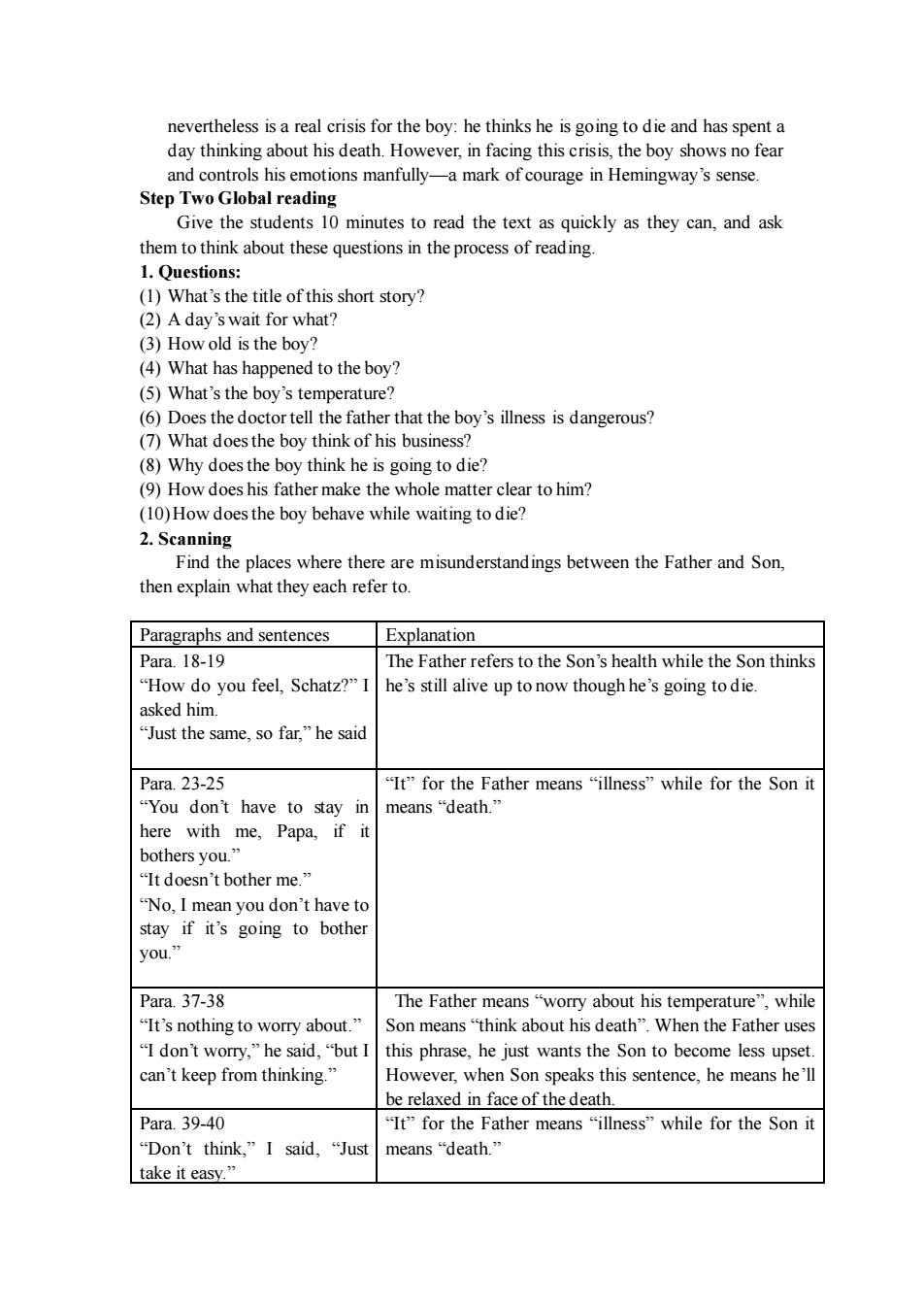
nevertheless is a real crisis for the boy:he thinks he is going to die and has spent a day thinking about his death.Ho wever,in facing this cris ,the boy shows no fear and control Step Two Global reading Give the students 10 minutes to read the text as quickly as they can,and ask them to think about these questions in the process of reading. (1)What's the title of this short story? (2)A day's wait for what' (3)How old is the boy? (4)What has happened to the boy? (5)What's the boy's temperature? tortell the fat r that the boy's illness is dangerous? (8)Why doesthe boy think he is going to die? (9)How does his father make the whole matter clear to him? (10)How does the boy behave while waiting to die? 2.Scanning Find the places where there are misunderstandings between the Father and Son, then explain what they each refer to. Paragraphs and sentences Explanation Para.18-19 The Father refers to the Son's health while the Son thinks "How do you feel,Schatz?"I he's still alive up to now though he's going to die asked him. “Just the same,so far,.”hesaid Para.23-25 r”for the Father means“illness'”while for the Son it "You don't have to stay in means"death." here with me,Papa,if it bothers you." "It doesn't bother me." No I mean you don't have to stay if it's going to bothe you." Para.37-38 The Father means"worry about his temperature",while "It's nothing to worry about." Son means"think about his death"When the father use "dont worry,"he said,"but his phrase,he just wants the Son to become less upse can't keep from thinking." However,when Son speaks this sentence,he means he'll be relaxed in face of the death. Para.39-40 "It"for the Father means"illness"while for the Son it Don't think,”I said,.“Jus ans death.” take it easy
nevertheless is a real crisis for the boy: he thinks he is going to die and has spent a day thinking about his death. However, in facing this crisis, the boy shows no fear and controls his emotions manfully—a mark of courage in Hemingway’s sense. Step Two Global reading Give the students 10 minutes to read the text as quickly as they can, and ask them to think about these questions in the process of reading. 1. Questions: (1) What’s the title of this short story? (2) A day’s wait for what? (3) How old is the boy? (4) What has happened to the boy? (5) What’s the boy’s temperature? (6) Does the doctor tell the father that the boy’s illness is dangerous? (7) What does the boy think of his business? (8) Why does the boy think he is going to die? (9) How does his father make the whole matter clear to him? (10)How doesthe boy behave while waiting to die? 2. Scanning Find the places where there are misunderstandings between the Father and Son, then explain what they each refer to. Paragraphs and sentences Explanation Para. 18-19 “How do you feel, Schatz?” I asked him. “Just the same, so far,” he said The Father refers to the Son’s health while the Son thinks he’s still alive up to now though he’s going to die. Para. 23-25 “You don’t have to stay in here with me, Papa, if it bothers you.” “It doesn’t bother me.” “No, I mean you don’t have to stay if it’s going to bother you.” “It” for the Father means “illness” while for the Son it means “death.” Para. 37-38 “It’s nothing to worry about.” “I don’t worry,” he said, “but I can’t keep from thinking.” The Father means “worry about his temperature”, while Son means “think about his death”. When the Father uses this phrase, he just wants the Son to become less upset. However, when Son speaks this sentence, he means he’ll be relaxed in face of the death. Para. 39-40 “Don’t think,” I said, “Just take it easy.” “It” for the Father means “illness” while for the Son it means “death
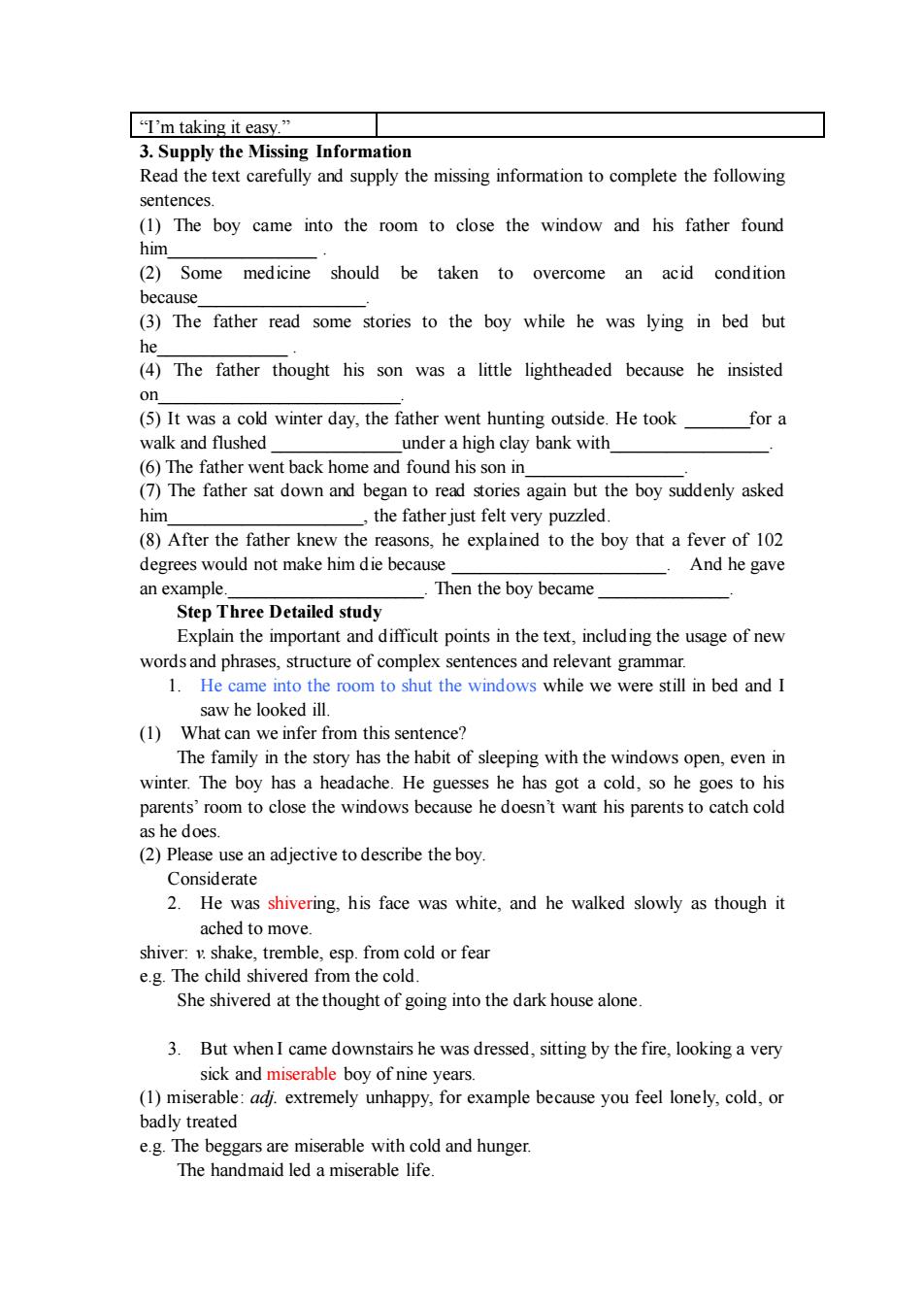
I'm taking it easy.” 3.Supply the Missing Information Read the text carefully and supply the missing information to complete the following sentences. (1)The boy came into the room to close the window and his father found (2)Some medicine should be taken to overcome an acid condition because (3)The father read some stories to the boy while he was lying in bed but he (4)The father thought his son was a little lightheaded because he insisted (5)It was a cold winter day,the father went hunting outside.He took for a walk and flushed」 _under a high clay bank with (6)The father went back home and found his son in (7)The father sat down and began to read stories again but the boy suddenly asked the father just felt very puz (8)After the father knew the reasons,he explained to the boy that a fever of 102 degrees would not make him die because And he gave an example. Then the boy became Step Three Detailed study Explain the important and difficult points in the text,including the usage of new wordsand phrases,structure of complex sentences and relevant gramma 1.He came into the room to shut the windows while we were still in bed and I saw he looked ill. (1)What can we infer from this sentence? The family in the story has the habit of sleeping with the windows open,even in winter.The boy has a headache.He guesses he has got a cold,so he goes to his parents'room to close the windows because he doesn't want his parents to catch cold as he does. (2)Please use an adjective to describe the boy. Considerate 2.He was shivering.his face was white,and he walked slowly as though it ached to move shiver:v.shake,tremble,esp.from cold or fear e.g.The child shivered from the cold. She shivered at the thought of going into the dark house alone 3.But whenI came downstairs he was dressed,sitting by the fire,looking a very sick and miserable boy of nine years. (1)miserable:adj.extremely unhappy,for example because you feel lonely,cold,or badly treated e.g.The beggars are miserable with cold and hunger The handmaid led a miserable life
“I’m taking it easy.” 3. Supply the Missing Information Read the text carefully and supply the missing information to complete the following sentences. (1) The boy came into the room to close the window and his father found him________________ . (2) Some medicine should be taken to overcome an acid condition because__________________. (3) The father read some stories to the boy while he was lying in bed but he______________ . (4) The father thought his son was a little lightheaded because he insisted on__________________________. (5) It was a cold winter day, the father went hunting outside. He took _______for a walk and flushed ______________under a high clay bank with_________________. (6) The father went back home and found his son in_________________. (7) The father sat down and began to read stories again but the boy suddenly asked him_____________________, the father just felt very puzzled. (8) After the father knew the reasons, he explained to the boy that a fever of 102 degrees would not make him die because _______________________. And he gave an example._____________________. Then the boy became ______________. Step Three Detailed study Explain the important and difficult points in the text, including the usage of new words and phrases, structure of complex sentences and relevant grammar. 1. He came into the room to shut the windows while we were still in bed and I saw he looked ill. (1) What can we infer from this sentence? The family in the story has the habit of sleeping with the windows open, even in winter. The boy has a headache. He guesses he has got a cold, so he goes to his parents’ room to close the windows because he doesn’t want his parents to catch cold as he does. (2) Please use an adjective to describe the boy. Considerate 2. He was shivering, his face was white, and he walked slowly as though it ached to move. shiver: v.shake, tremble, esp. from cold or fear e.g. The child shivered from the cold. She shivered at the thought of going into the dark house alone. 3. But when I came downstairs he was dressed, sitting by the fire, looking a very sick and miserable boy of nine years. (1) miserable: adj. extremely unhappy, for example because you feel lonely, cold, or badly treated e.g. The beggars are miserable with cold and hunger. The handmaid led a miserable life
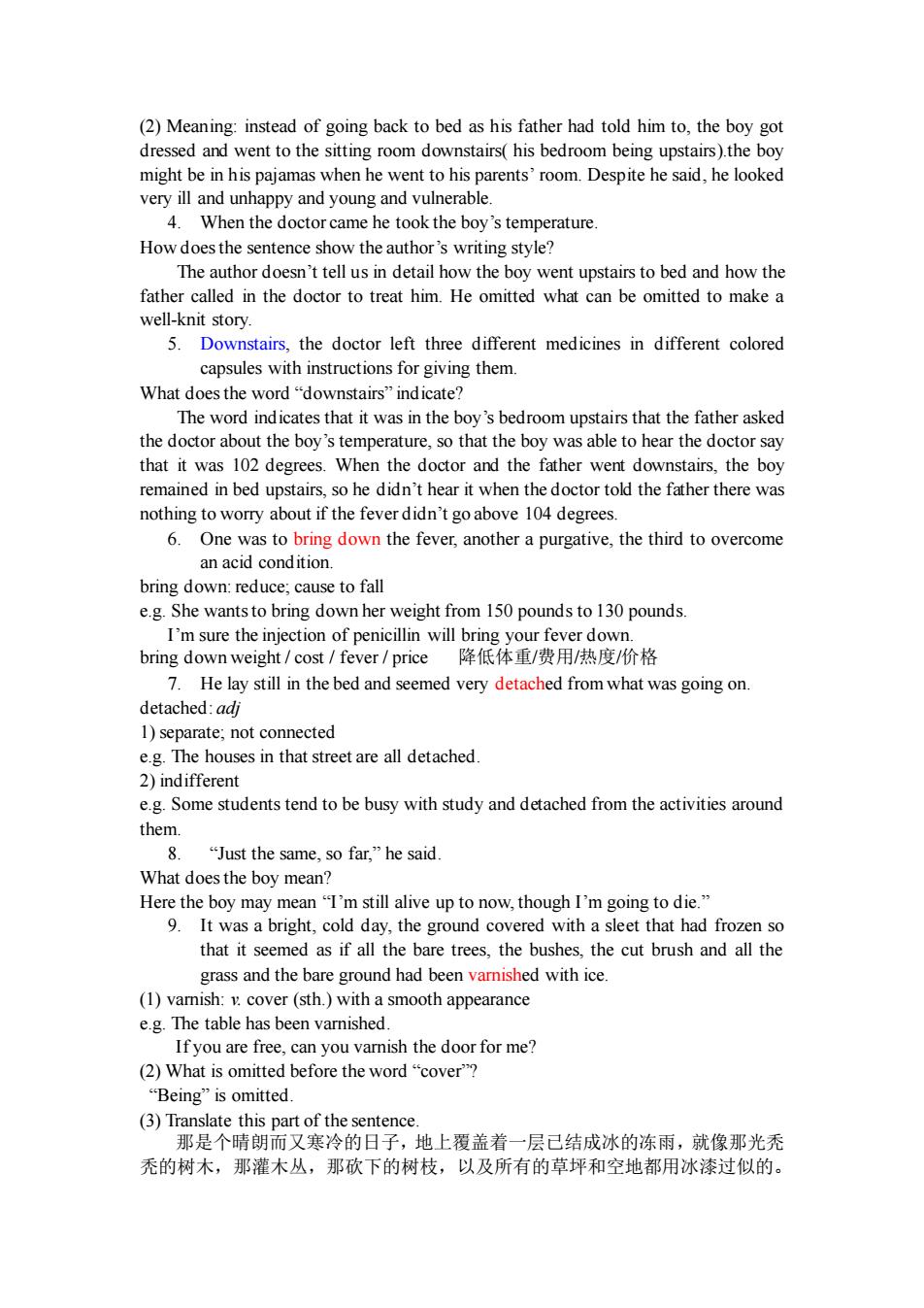
(2)Meaning:instead of going back to bed as his father had told him to,the boy got entto the downstairs(his bedro m be s)the might be in his pajamas when he went to his parents'room.Despite he said,he looked very ill and unhappy and young and vulnerable. 4.When the doctor came he took the boy's temperature How does the sentence show the author's writing style? The author doesn't tell us in detail how the b went upstairs to bed and how the e doctor to treat him.He omitted what can be omitted to make a well-knit story. 5.Downstairs.the doctor left three different medicines in different colored capsules with instructions for giving them What does the word“downstairs”indicate? The word indica es that it was in the boys bedroom upstairs tha at the father asked the doctor about the boy's temperature,so that the boy was able to hear the doctor say that it was 102 degrees.When the doctor and the father went downstairs,the boy remained in bed upstairs,so he didn't hear it when the doctor told the father there was nothing to worry about if the feverdidn't goabove 104 degrees. 6. One S to ng down the fever,another a purgative,the third to overcome an acid conditio bring down:reduce;cause to fall e.g.She wants to bring down her weight from 150 pounds to 130 pounds. I'm sure the injection of penicillin will bring your fever down. bring down weight/.cost/fever/price降低体重/费用/热度/价格 He lay still in the bed and seemed very detached from what was going on detached:adj 1)separate;not connected e.g.The houses in that street are all detached 2)indifferent e.g.Some students tend to be busy with study and detached from the activities around them 8 "Just the same,so far,"he said. What does the boy mean? Here the boy may mean"I'm still alive up to now.though I'm going to die 0 It was a bright,cold day,the ground covered with a sleet that had frozen so that it seer as if all the bare trees the bushes,the cut brush and all the grass and the bare ground had been varnished with ice. (1)varnish:v.cover (sth.)with a smooth appearance e.g.The table has been varnished. (2)What is om the word "cover Being”is omitted (3)Translate this part of the sentence. 邦是个晴朗而又寒冷的日子,地上覆盖着一层已结成冰的冻雨,就像那光秃 秃的树木,那灌木丛,那砍下的树枝,以及所有的草坪和空地都用冰漆过似的
(2) Meaning: instead of going back to bed as his father had told him to, the boy got dressed and went to the sitting room downstairs( his bedroom being upstairs).the boy might be in his pajamas when he went to his parents’ room. Despite he said, he looked very ill and unhappy and young and vulnerable. 4. When the doctor came he took the boy’s temperature. How does the sentence show the author’s writing style? The author doesn’t tell us in detail how the boy went upstairs to bed and how the father called in the doctor to treat him. He omitted what can be omitted to make a well-knit story. 5. Downstairs, the doctor left three different medicines in different colored capsules with instructions for giving them. What does the word “downstairs” indicate? The word indicates that it was in the boy’s bedroom upstairs that the father asked the doctor about the boy’s temperature, so that the boy was able to hear the doctor say that it was 102 degrees. When the doctor and the father went downstairs, the boy remained in bed upstairs, so he didn’t hear it when the doctor told the father there was nothing to worry about if the fever didn’t go above 104 degrees. 6. One was to bring down the fever, another a purgative, the third to overcome an acid condition. bring down: reduce; cause to fall e.g. She wants to bring down her weight from 150 pounds to 130 pounds. I’m sure the injection of penicillin will bring your fever down. bring down weight / cost / fever / price 降低体重/费用/热度/价格 7. He lay still in the bed and seemed very detached from what was going on. detached: adj 1) separate; not connected e.g. The houses in that street are all detached. 2) indifferent e.g. Some students tend to be busy with study and detached from the activities around them. 8. “Just the same, so far,” he said. What does the boy mean? Here the boy may mean “I’m still alive up to now, though I’m going to die.” 9. It was a bright, cold day, the ground covered with a sleet that had frozen so that it seemed as if all the bare trees, the bushes, the cut brush and all the grass and the bare ground had been varnished with ice. (1) varnish: v. cover (sth.) with a smooth appearance e.g. The table has been varnished. If you are free, can you varnish the door for me? (2) What is omitted before the word “cover”? “Being” is omitted. (3) Translate this part of the sentence. 那是个晴朗而又寒冷的日子,地上覆盖着一层已结成冰的冻雨,就像那光秃 秃的树木,那灌木丛,那砍下的树枝,以及所有的草坪和空地都用冰漆过似的
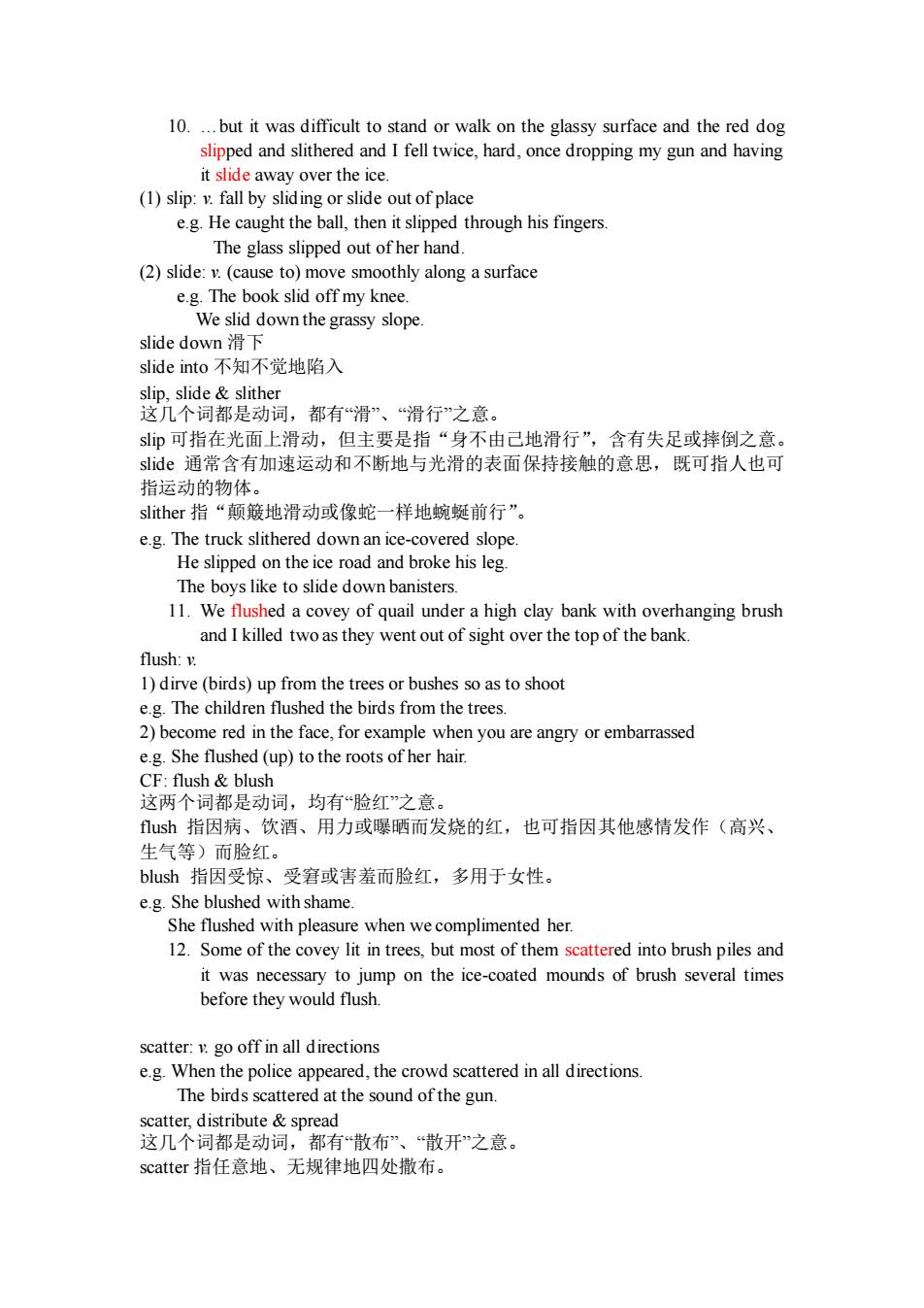
10.o walk on the glassy uface and the red dog siped and and Ifell wice,mygunand having it slide away over the ice. (1)slip:v.fall by sliding or slide out of place e.g.He caught the ball,then it slipped through his fingers. The glass slipped out ofher hand. (2)slide:.(cause to)move smoothly along asurface e.g.The book slid off my knee We slid down the grassy slope slide down滑下 slide into不知不觉地陷入 都有、活行产之意 sp可指在光面上滑动, 但主要 指“身不由己地滑行”,含有失足或摔倒之意 slide通常含有加速运动和不断地与光滑的表面保持接触的意思,既可指人也可 指运动的物体。 slither指“颠簸地滑动或像蛇一样地蜿蜒前行”。 e.g.The etruck slithered down an ice-covered slope He slipped on the ice road and broke his leg. The boys like to slide down banisters. 11.We flushed a covey of quail under a high clay bank with overhanging brush and I killed two as they went out of sight over the top of the bank. flush: 1)dirve(birds)up from the trees or bushes so as to shoo e.g.The children flushed the birds from the trees. 2)become red in the face,for example when you are angry or embarrassed e.g.She flushed (up)to the roots of her hair. CF:flush blush 这两个词都是动词,均有“脸红”之意 ush指因病、饮酒、用力或曝晒而发烧的红,也可指因其他感情发作(高兴、 生气等)而脸红。 blush指因受惊、受窘或害羞而脸红,多用于女性。 e.g.She blushed with shame. She flushed with pleasu Some of the covey lit in trees.but most of them scattered into brush piles and it was necessary to jump on the ice-coated mounds of brush several times before they would flush scatter:v.go off in all directions e.g.When the police appeared,the crowd scattered inall directions The birds scattered at the sound of the gun. scatter,distribute spread 这几个词都是动词,都有散布”、“散开”之意。 scatter指任意地、无规律地四处撤布
10. …but it was difficult to stand or walk on the glassy surface and the red dog slipped and slithered and I fell twice, hard, once dropping my gun and having it slide away over the ice. (1) slip: v. fall by sliding or slide out of place e.g. He caught the ball, then it slipped through his fingers. The glass slipped out of her hand. (2) slide: v. (cause to) move smoothly along a surface e.g. The book slid off my knee. We slid down the grassy slope. slide down 滑下 slide into 不知不觉地陷入 slip, slide & slither 这几个词都是动词,都有“滑”、“滑行”之意。 slip 可指在光面上滑动,但主要是指“身不由己地滑行”,含有失足或摔倒之意。 slide 通常含有加速运动和不断地与光滑的表面保持接触的意思,既可指人也可 指运动的物体。 slither 指“颠簸地滑动或像蛇一样地蜿蜒前行”。 e.g. The truck slithered down an ice-covered slope. He slipped on the ice road and broke his leg. The boys like to slide down banisters. 11. We flushed a covey of quail under a high clay bank with overhanging brush and I killed two as they went out of sight over the top of the bank. flush: v. 1) dirve (birds) up from the trees or bushes so as to shoot e.g. The children flushed the birds from the trees. 2) become red in the face, for example when you are angry or embarrassed e.g. She flushed (up) to the roots of her hair. CF: flush & blush 这两个词都是动词,均有“脸红”之意。 flush 指因病、饮酒、用力或曝晒而发烧的红,也可指因其他感情发作(高兴、 生气等)而脸红。 blush 指因受惊、受窘或害羞而脸红,多用于女性。 e.g. She blushed with shame. She flushed with pleasure when we complimented her. 12. Some of the covey lit in trees, but most of them scattered into brush piles and it was necessary to jump on the ice-coated mounds of brush several times before they would flush. scatter: v. go off in all directions e.g. When the police appeared, the crowd scattered in all directions. The birds scattered at the sound of the gun. scatter, distribute & spread 这几个词都是动词,都有“散布”、“散开”之意。 scatter 指任意地、无规律地四处撒布
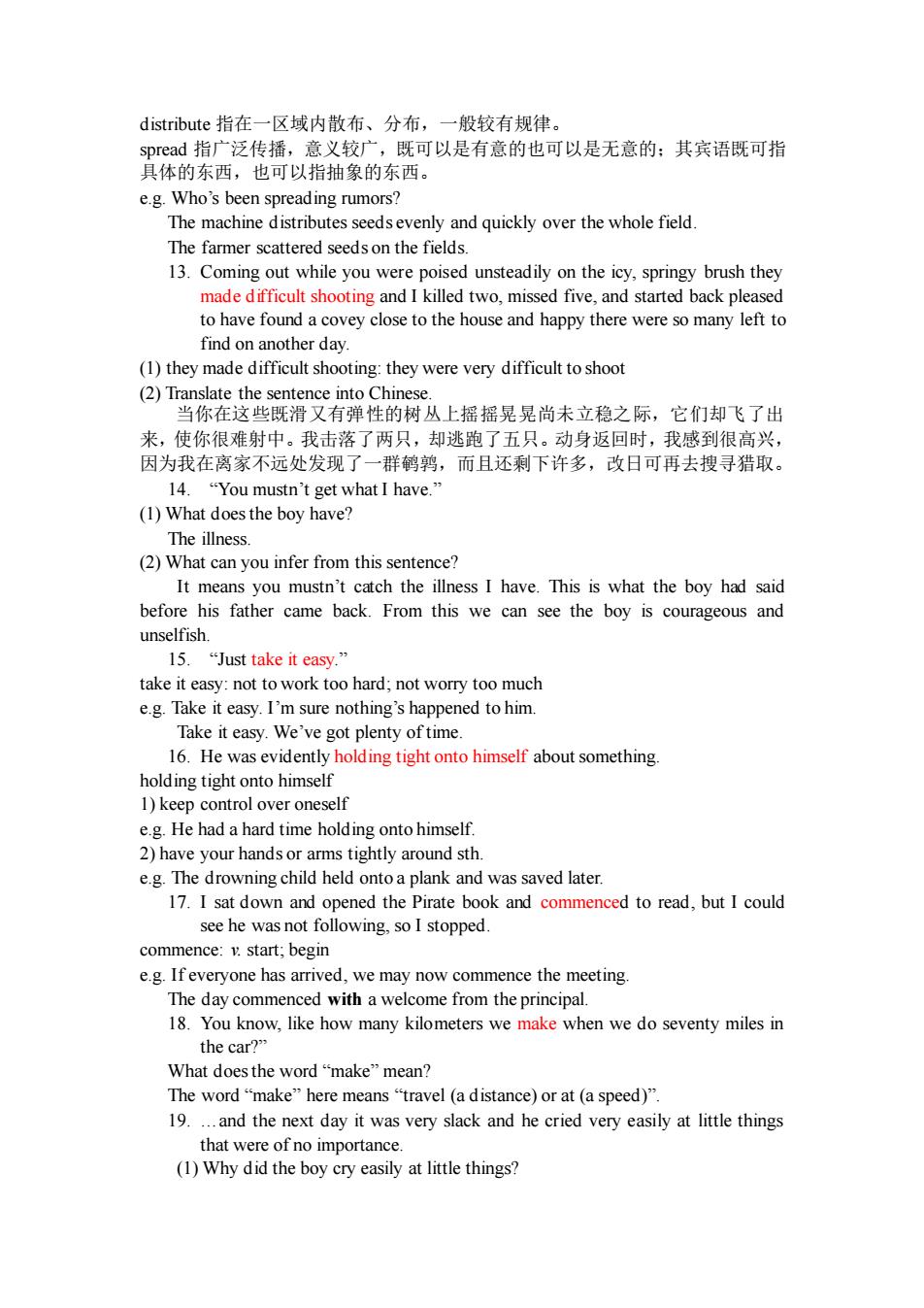
distribute指在一区域内散布、分布,一般较有规律。 霜装产德需的未以有的电司收是无的:光黄蓝新 e.g.Who's been spreading rumors? The machine distributes seedsevenly and quickly over the whole field The farmer scattered seeds on the fields. 13.Comi ng out while you we to have found a covey close to the house and happy there were so many left to find on another dav. (1)they made difficult shooting:they were very difficult to shoot 回)你这e受有弹生的精丛上摇摇晃晃尚未立稳之际·它们 into Chir 来,使你很难射中。我击落了两只,却逃跑了五只。动身返回时,我感到很高兴, 因为我在离家不远处发现了一群鹌鹑,而且还剩下许多,改日可再去搜寻猎取。 14."You mustn't get what I have." (1)What does the boy have? (G) It means you mustn't catch the illness I have.This is what the boy had said before his father came back.From this we can see the boy is courageous and unselfish. l5.Just take it easy.” take it easy:not to work too hard:not worry too much e.g.Take it easy.I'm sure nothing's happened to him Take it easy.We've got plenty of time. 16.He was evidently holding tight onto himself about something. holding tight onto himself 1)ke ntrol over e.g.He had a hard time holding onto himself. 2)have your hands or arms tightly around sth e.g.The drowning child held onto a plank and was saved later. 17.I sat down and opened the Pirate book and commenced to read,but I could see he was not following.soI stopped. commence:v.start:begir e.g.Ifeveryone has arrived,we may now commence the meeting. The day commenced with a welcome from the principal. 18.You know.like how many kilometers we make when we do seventy miles in the car” What doesthe The word" 19....and the next day it was very slack and he cried very easily at little things that were of no importance. (1)Why did the boy cry easily at little things?
distribute 指在一区域内散布、分布,一般较有规律。 spread 指广泛传播,意义较广,既可以是有意的也可以是无意的;其宾语既可指 具体的东西,也可以指抽象的东西。 e.g. Who’s been spreading rumors? The machine distributes seeds evenly and quickly over the whole field. The farmer scattered seeds on the fields. 13. Coming out while you were poised unsteadily on the icy, springy brush they made difficult shooting and I killed two, missed five, and started back pleased to have found a covey close to the house and happy there were so many left to find on another day. (1) they made difficult shooting: they were very difficult to shoot (2) Translate the sentence into Chinese. 当你在这些既滑又有弹性的树丛上摇摇晃晃尚未立稳之际,它们却飞了出 来,使你很难射中。我击落了两只,却逃跑了五只。动身返回时,我感到很高兴, 因为我在离家不远处发现了一群鹌鹑,而且还剩下许多,改日可再去搜寻猎取。 14. “You mustn’t get what I have.” (1) What does the boy have? The illness. (2) What can you infer from this sentence? It means you mustn’t catch the illness I have. This is what the boy had said before his father came back. From this we can see the boy is courageous and unselfish. 15. “Just take it easy.” take it easy: not to work too hard; not worry too much e.g. Take it easy. I’m sure nothing’s happened to him. Take it easy. We’ve got plenty of time. 16. He was evidently holding tight onto himself about something. holding tight onto himself 1) keep control over oneself e.g. He had a hard time holding onto himself. 2) have your hands or arms tightly around sth. e.g. The drowning child held onto a plank and was saved later. 17. I sat down and opened the Pirate book and commenced to read, but I could see he was not following, so I stopped. commence: v. start; begin e.g. If everyone has arrived, we may now commence the meeting. The day commenced with a welcome from the principal. 18. You know, like how many kilometers we make when we do seventy miles in the car?” What does the word “make” mean? The word “make” here means “travel (a distance) or at (a speed)”. 19. …and the next day it was very slack and he cried very easily at little things that were of no importance. (1) Why did the boy cry easily at little things?
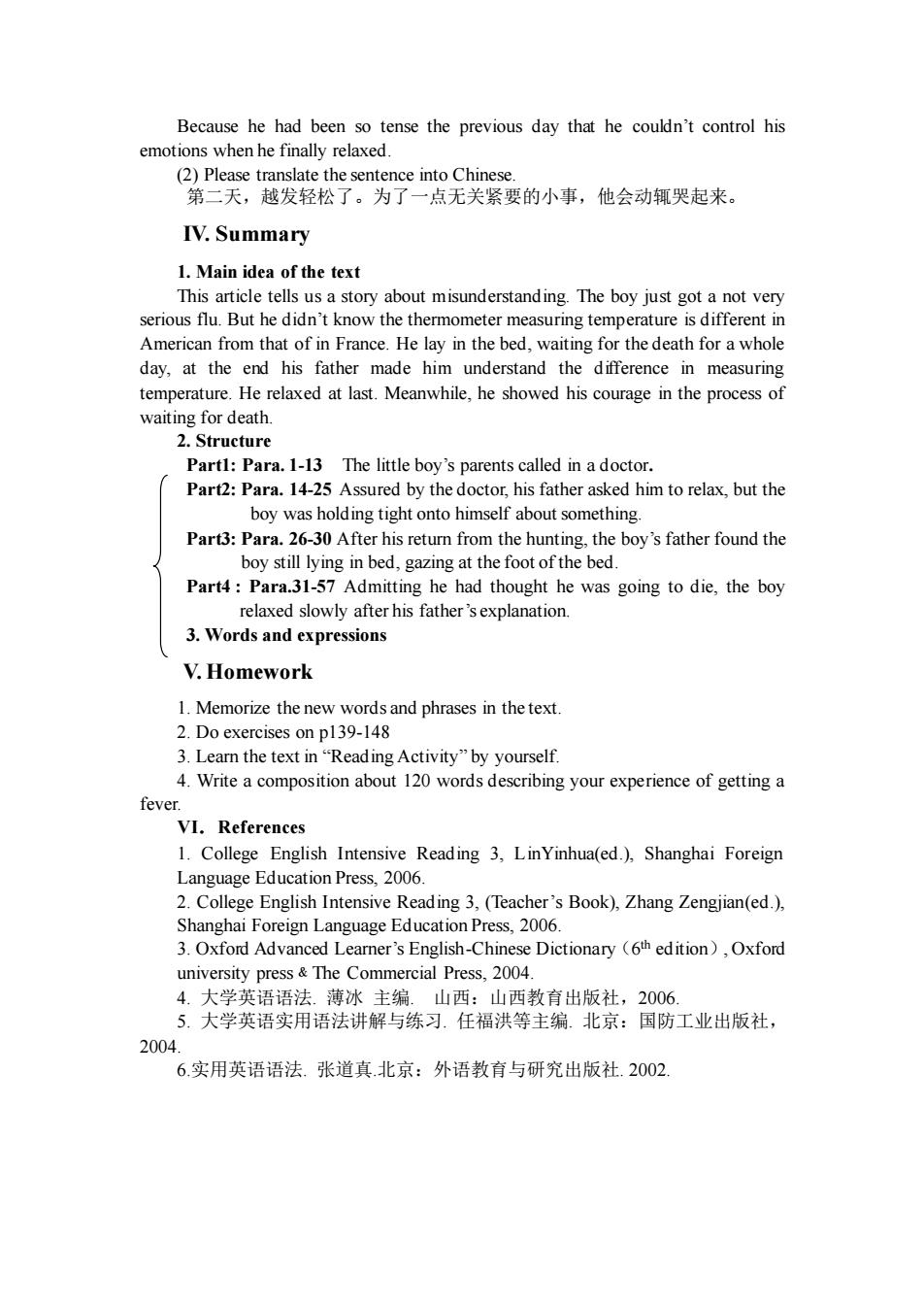
Because he had been so tense the previous day that he couldn't control his emotions when he finally relaxed 一点无关紧要的小事,他会动辄哭起来。 IV.Summary 1.Main idea of the tex This article tells us a story about misunderstanding.The boy just got a not very serious flu.But he didn't know the thermometer measuring temperature is different in American from that of in France.He lay in the bed,waiting for the death for a whole day.at the end his father made him understand the difference in measuring temperature.He relaxed at last.Meanwhile,he showed his courage in the process of waiting for death 2.Structure Partl:Para.1-13 The little boy's parents called in a doctor. Part2:Para.14-25 Assured by the doctor,his father asked him to relax,but the boy was holding tight onto himself about something Part3:Para.26-30Afte his retum fron m the hu ting.the boy's father found the boy still lying in bed,gazing at the foot of the be Part4:Para.31-57 Admitting he had thought he was going to die,the boy relaxed slowly after his father's explanation. 3.Words and expressions V.Homework 1.Memorize the new words and phrases in the text. 2.Do exercises on pl39-148 3.Leam the text inReding Activity"by yoursef 4.Write a composition about 120 vords scribing your experience of getting a feve VI.References 1.College English Intensive Reading 3,LinYinhua(ed.).Shanghai Foreign Language Education Press,2006. 2.College English Intensive Reading 3,(Teacher's Book),Zhang Zengjian(ed.). on P 2006 Leamer's English-Chinese Dictionary (hedition),Oxford university press The Commercial Press,2004 4.大学英语语法.薄冰主编.山西:山西教育出版社,2006. .大学英语实用语法讲解与练习.任福洪等主编.北京:国防工业出版社, 2004 6.实用英语语法.张道真北京:外语教育与研究出版社.2002
Because he had been so tense the previous day that he couldn’t control his emotions when he finally relaxed. (2) Please translate the sentence into Chinese. 第二天,越发轻松了。为了一点无关紧要的小事,他会动辄哭起来。 IV. Summary 1. Main idea of the text This article tells us a story about misunderstanding. The boy just got a not very serious flu. But he didn’t know the thermometer measuring temperature is different in American from that of in France. He lay in the bed, waiting for the death for a whole day, at the end his father made him understand the difference in measuring temperature. He relaxed at last. Meanwhile, he showed his courage in the process of waiting for death. 2. Structure Part1: Para. 1-13 The little boy’s parents called in a doctor. Part2: Para. 14-25 Assured by the doctor, his father asked him to relax, but the boy was holding tight onto himself about something. Part3: Para. 26-30 After his return from the hunting, the boy’s father found the boy still lying in bed, gazing at the foot of the bed. Part4 : Para.31-57 Admitting he had thought he was going to die, the boy relaxed slowly after his father’s explanation. 3. Words and expressions V. Homework 1. Memorize the new words and phrases in the text. 2. Do exercises on p139-148 3. Learn the text in “Reading Activity” by yourself. 4. Write a composition about 120 words describing your experience of getting a fever. VI.References 1. College English Intensive Reading 3, LinYinhua(ed.), Shanghai Foreign Language Education Press, 2006. 2. College English Intensive Reading 3, (Teacher’s Book), Zhang Zengjian(ed.), Shanghai Foreign Language Education Press, 2006. 3. Oxford Advanced Learner’s English-Chinese Dictionary(6 th edition), Oxford university press﹠The Commercial Press, 2004. 4. 大学英语语法. 薄冰 主编. 山西:山西教育出版社,2006. 5. 大学英语实用语法讲解与练习. 任福洪等主编. 北京:国防工业出版社, 2004. 6.实用英语语法. 张道真.北京:外语教育与研究出版社. 2002